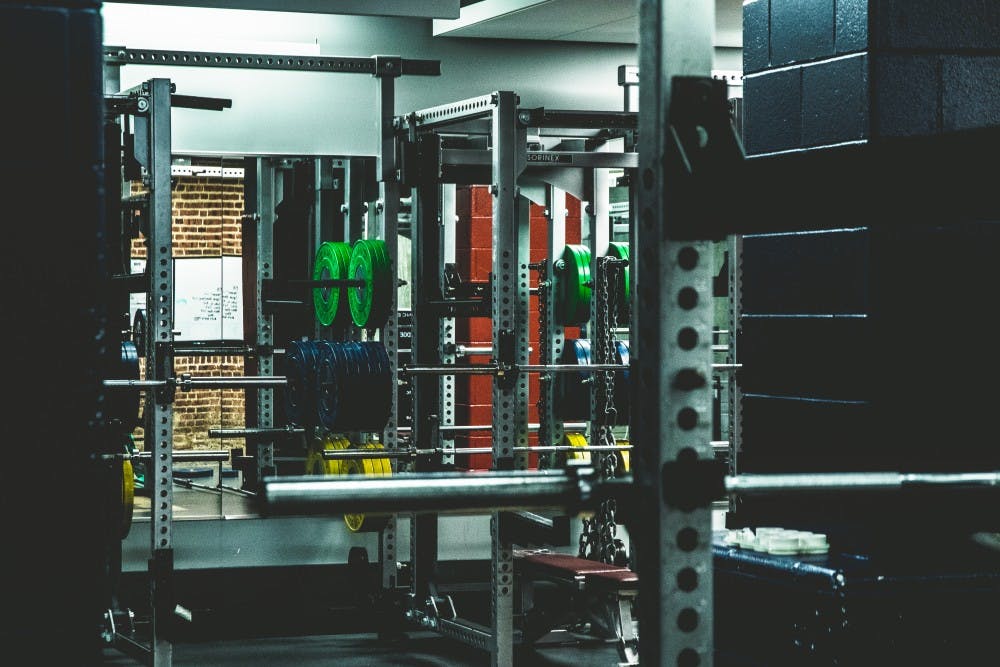
Penn football's new strength training program emphasizes frequently "micro-lifts" instead of longer workouts.
Credit: Alec DrugganAny athlete will stress the importance of training in the offseason. Strength and conditioning is a vital part to any level of athletics, and even small changes in workout programs can have a significant impact on player performance.
Assistant strength and conditioning coach Miguel Rivera is hoping that his approach to training athletes will have a sizable impact on Penn's athletic performance. Rivera has stressed high-frequency workouts he calls "micro-lifts," as senior wide receiver Kolton Huber noted.
"Coach Rivera breaks workouts up into micro-lifts. Instead of being in the weight room twice a week lifting for an hour or an hour and a half, we're doing a lot more explosive exercise that is spread out over four or five days," Huber said. "We're doing less reps and less sets but there is more mobility emphasized. His workouts help get us warmed up right before practice, and we don't have to spend as much time on warm-ups as a result."
In addition to spreading out workouts over the week, Rivera has also focused on player health by stressing the importance of nutrition.
"I feel like we're more focused on developing the player as an athlete and a person," senior defensive lineman Prince Emili said. "We do a lot more flexibility stuff but also we're really focused on nutrition and discipline. It's more well-rounded than before."
According to Emili, Rivera brings a passion for nutrition, health, and fitness to the Quakers, and he goes out of his way to help players improve.
"He's all-in to the program. I remember one of the hotter days he was cutting up strawberries so we could eat them, and another day he brought a blender so he could make us smoothies after the lifts," Emili said. "He just seems like he really cares about the program. They had like vanilla peanut butter, chocolate peanut butter, you name it. He really chefs it up."
For Rivera, everything in athletes' workouts has to have a purpose; their time is valuable, and he shouldn't be wasting it.
"We do things a different way in that everything we do has to have a purpose, and we want to be as efficient as possible," Rivera said. "These athletes are extremely busy and take things very seriously, so we want everything we do to help them improve and stay healthy."
Elaborating on his workout plan, Rivera noted that he tailored individual workouts to injury prevention.
"Everything I do when it comes to setting the agenda is based on injury prevention. The exercises, the things that I program in, the stretching, the mobility, the soft-tissue stuff, all of it helps players stay healthy," Rivera said. "You've gotta be very cautious about the exercises you're doing. For example, we're not gonna hang clean this season; to me, it's tough on the wrist, elbow and shoulders, so we're not gonna do it."
Huber has noticed less injuries across the board for Penn football.
"Some guys don't treat warmups seriously, but Rivera forces us to get the blood pumping before practice which helps a lot with player health," Huber said. "Specifically, I've noticed a lot less hamstring, shoulder, and neck injuries as well as concussions."
With a change in workouts comes an emphasis on different types of machines. This year, Rivera has introduced newer workout machines that Huber finds effective.
"So we've added a few more machines into our workouts. The Kaiser machine is one that we use a little bit more to help with rotational stuff," Huber said. "Now we're using clips on the bar, creating a little more player safety for all athletes. I think a lot of it has been about player safety and player health."
And while the athletes heap praise on Rivera for his efforts, Rivera is appreciative of the student-athletes he gets to work with.
"Penn athletes are great kids, and they're really hard workers," Rivera said. "You're working with student-athletes who are passionate about what they do, and it makes my job that much easier."
The Daily Pennsylvanian is an independent, student-run newspaper. Please consider making a donation to support the coverage that shapes the University. Your generosity ensures a future of strong journalism at Penn.
Donate



